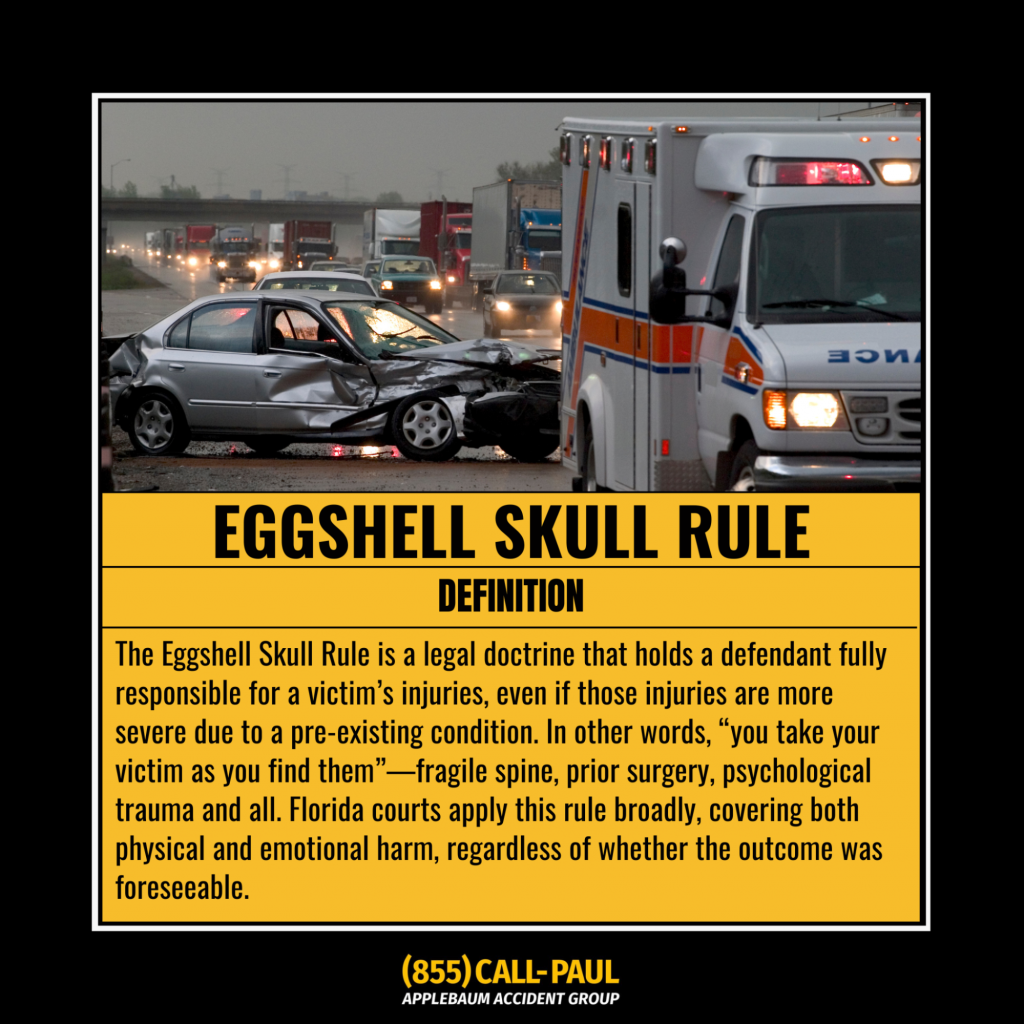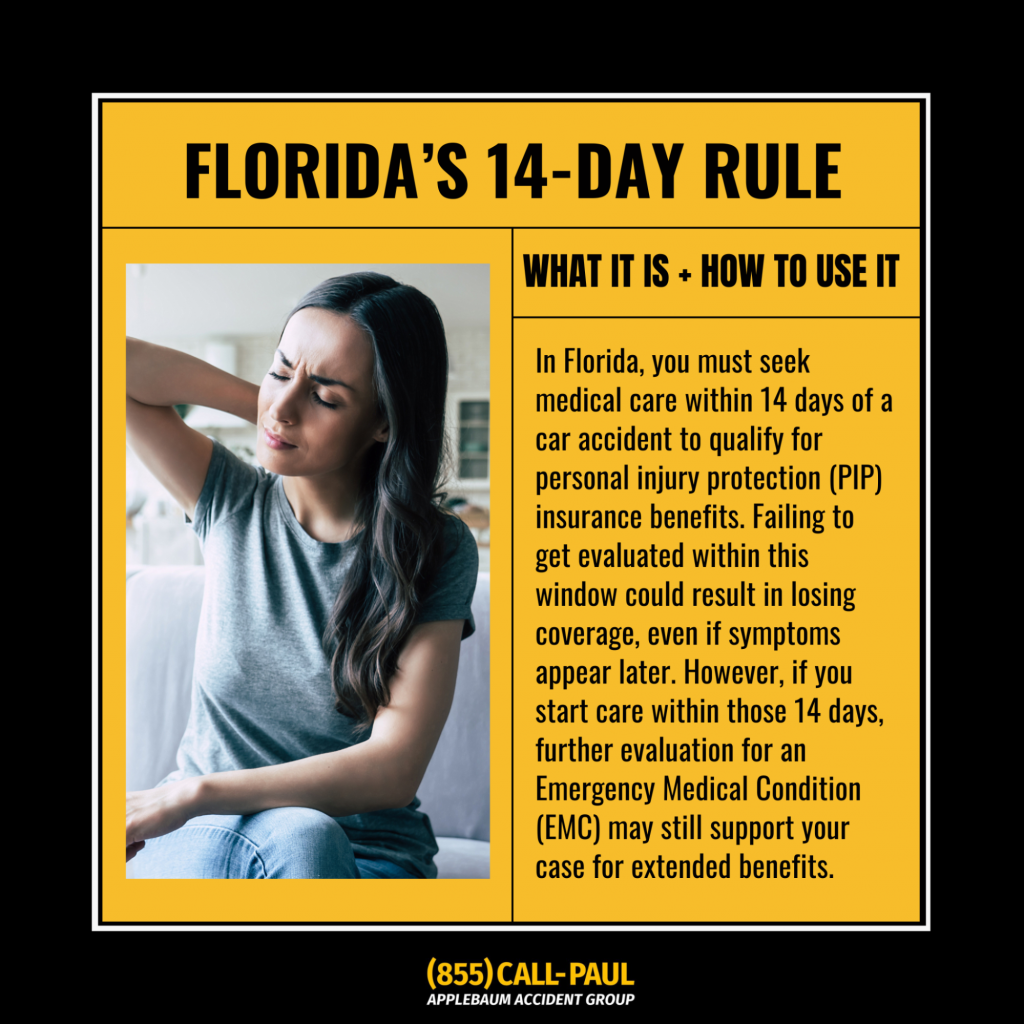If you’ve been injured in a car accident and already had a pre-existing condition, like a bad back, recent surgery, or PTSD, you might assume you’re out of luck. But under Florida’s Eggshell Skull Rule, people who suffer worse outcomes because of prior health issues are protected. In fact, your condition could strengthen your legal position, if you act fast and document properly.
Florida Eggshell Skull Rule At-A-Glance
- You take your victim as you find them: even if they’re medically vulnerable
- Full liability still applies: a minor crash that causes major injury is still compensable
- Pre-existing doesn’t mean pre-excused: old injuries made worse by a crash are covered
- You don’t need to prove the crash caused your condition: only that it aggravated it
- 14-Day Rule is critical: you must seek medical care within two weeks to preserve PIP benefits
In this guide, we’ll break down how this doctrine works, what Florida’s 14-Day Rule means for your claim, and how to protect your rights when insurers try to weaponize your medical history.
What Is the Eggshell Skull Rule in Florida?

The Eggshell Skull Rule is a legal principle that says: “You take your victim as you find them.” In practice, this means if a car accident causes more severe injuries because the victim had a fragile spine, prior surgery, or psychological trauma, the defendant is still fully liable for all resulting damage.
The rule derived from case law Vosburg v. Putney, 1891, where a seemingly harmless kick to a classmate’s leg led to serious medical complications. That precedent established that the defendant could be held responsible for all consequences, even those they couldn’t have predicted.
Florida courts apply this doctrine to both physical and emotional injuries. This includes scenarios where a fender bender triggers nerve damage or a minor classroom demonstration results in PTSD due to previous trauma.
It’s not confined to car crashes, slip-and-falls and even classroom reenactments of tort cases have invoked it.
If you’re unsure how this applies to your case, or whether your prior condition weakens or strengthens your legal position, speak with someone who can clarify your options.
Why This Rule Matters More Than Ever in Florida Injury Claims
With Florida’s high rates of elderly drivers, retirees, and individuals managing chronic conditions, the Eggshell Skull Rule plays a pivotal role in protecting vulnerable populations. Insurance companies often argue that severe injuries are just a reflection of aging or pre-existing health, not the crash. This doctrine flips that argument: it confirms that even if a minor impact leads to major consequences, full compensation is still on the table.
Where the Rule Gets Misunderstood (And Why It Matters)
Many accident victims think having a “bad back” or old diagnosis weakens their case. In reality, the Eggshell Skull Rule is one of the few legal protections that turns that vulnerability into a legal advantage if handled correctly. It doesn’t require that the at-fault party knew about your condition; it only requires that their actions caused your suffering to worsen. Misunderstanding this rule can lead victims to settle for far less than they deserve.
What Counts as a Pre-Existing Condition?
A pre-existing condition is any health issue, physical or psychological, that existed before the accident. It might be something chronic, like arthritis, disc degeneration, or PTSD. It could also include recent surgeries, past head injuries, or even latent mental health struggles.
If an accident makes them worse, the Eggshell Skull Rule requires the at-fault party to compensate for that aggravation.
But what if you didn’t even know about the condition?
You may still qualify. Courts have acknowledged that people don’t always know they have a vulnerability until an event exposes it. What matters is whether evidence, like medical imaging or expert testimony, shows the crash triggered or worsened the issue.
That’s why honest disclosure is non-negotiable. Attempting to hide a past condition only undermines your credibility and weakens your case.
Medical Conditions That Often Trigger Legal Disputes
Not all pre-existing conditions spark legal pushback, but some almost always do. These include soft tissue injuries (like whiplash), spine and disc issues, post-concussive symptoms, and mental health conditions such as anxiety or depression. Insurance adjusters tend to fixate on these because they’re harder to quantify, and easier to blame on your “history.” That’s why clear medical documentation and expert opinions are critical when these conditions are involved.
How Life Events Can Turn Into Legal Vulnerabilities
Sometimes, a pre-existing condition is contextual. For example, someone recovering from childbirth, recent surgery, or even high-stress life events may be more fragile physically or emotionally. These factors, while not always diagnosed, can influence how a crash affects them. The Eggshell Skull Rule still applies if the accident aggravates that fragility, and attorneys who understand this nuance can frame those events as valid parts of the injury story.
The 14-Day Rule: Why Timing Is Everything in Florida

In Florida, you must see a medical provider within 14 days of your accident to retain your right to Personal Injury Protection (PIP) benefits. This is called the 14-day accident law, this guide to the Florida 14-day accident law explains everything you need to know.
Good news: virtual consultations now count toward the 14-day deadline. If mobility or fear of in-person visits is a barrier, remote evaluations through Applebaum’s network can preserve your claim.
What if your symptoms started after 2 weeks?
You can possibly get compensation, but you’ll need strong documentation to prove delayed onset and immediate reporting once symptoms appeared. Timing your treatment and starting your medical paper trail early could be the difference between being heard and being dismissed.
How Insurance Companies Use Your Pre-Existing Condition Against You
One of the oldest tricks in the book for insurance adjusters is to claim, “It wasn’t the accident, it was your condition.” It’s a go-to defense strategy meant to reduce or deny compensation by blaming the injury on your past, not the crash.
That’s why insurers push so hard to access your complete medical history. They want to pore through old injuries, mental health notes, surgeries, even things unrelated to the crash, hoping to find anything they can use as ammunition.
Here’s the catch: you do need to disclose pre-existing conditions. Trying to hide them usually backfires. If a discrepancy shows up in your records, your credibility suffers, and once trust is gone, even legitimate claims become uphill battles.
What You’re Entitled to After a Crash with a Pre-Existing Condition
The law demands recovery if you have a medical history. The Eggshell Skull Rule ensures that when someone else’s negligence makes your condition worse, you’re entitled to full compensation for:
- Medical expenses: including current bills, future treatments, and therapies that stem from worsened injuries.
- Pain and suffering: especially when a crash deepens pre-existing emotional or psychological conditions like anxiety, PTSD, or depression.
- Lost wages: if recovery time stretches out due to a vulnerable condition, or if complications prevent you from working entirely.
Now here’s a real-world complication that catches many off guard: your payout could be at risk if you don’t protect it properly.
How Applebaum Accident Group Helps You Navigate This

Navigating a crash claim with a pre-existing condition is like walking through a legal minefield, one misstep, and insurers will try to blame everything on your past. That’s where Applebaum Accident Group makes the difference.
We’ll connect you to:
- Attorneys who understand Florida’s Eggshell Skull Rule and how to win these cases
- Doctors who document injuries clearly and quickly, even virtually
- A referral process that protects your dignity, privacy, and timeline
We don’t just refer you, we protect your time, your claim, and your dignity.





